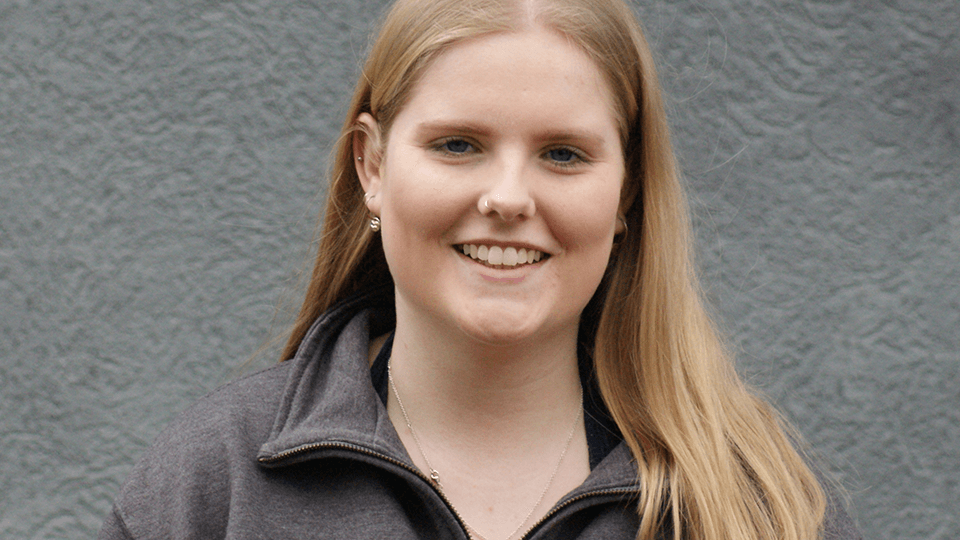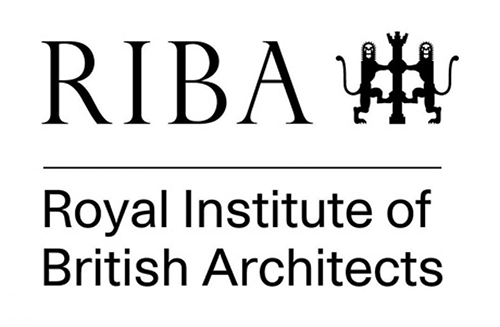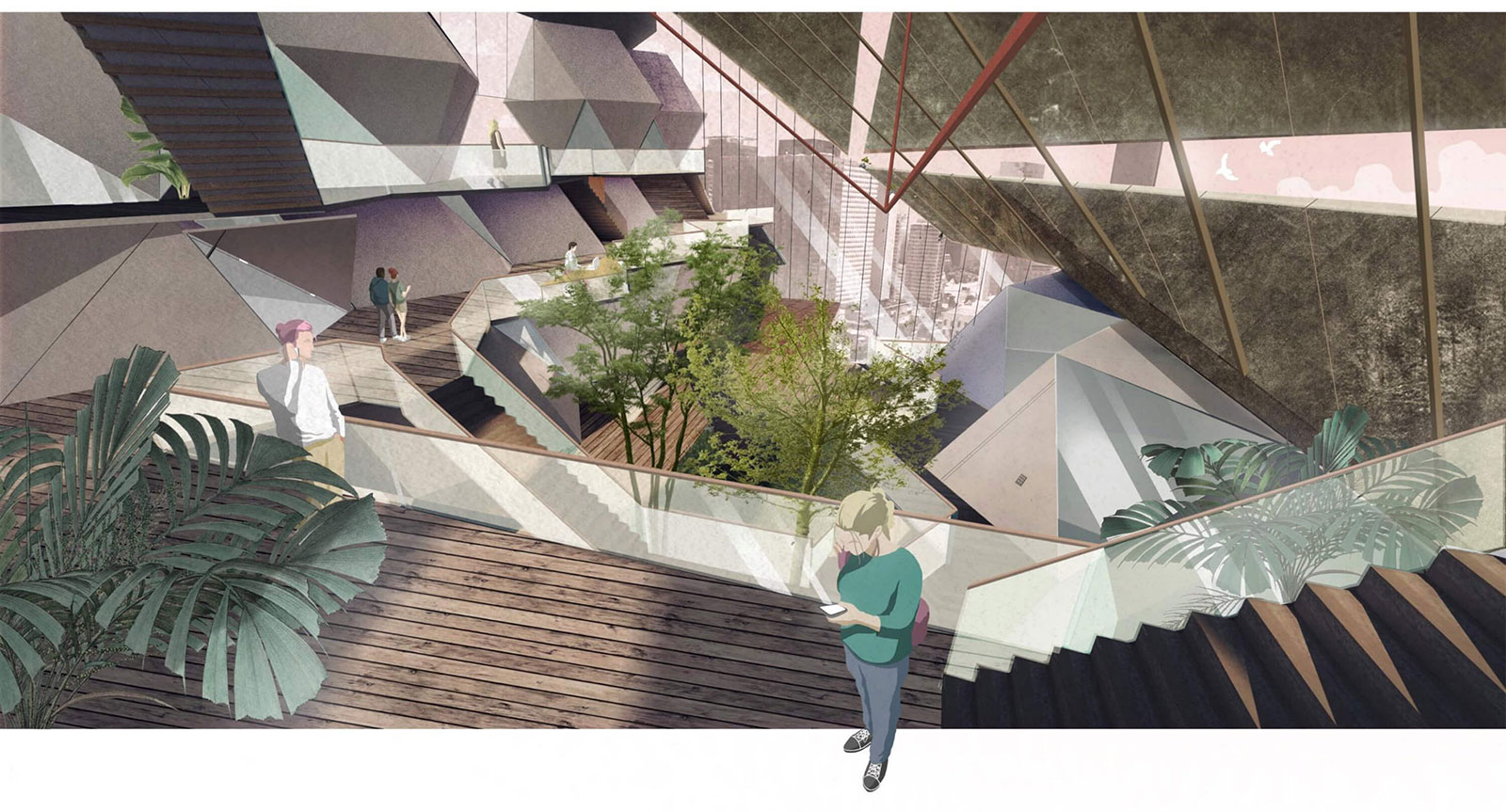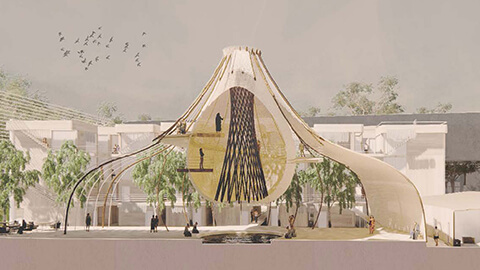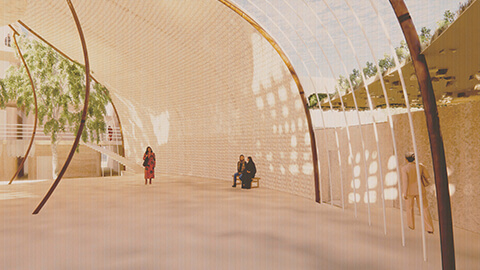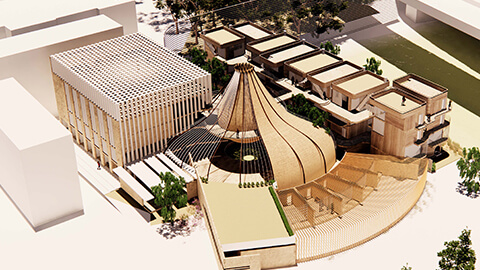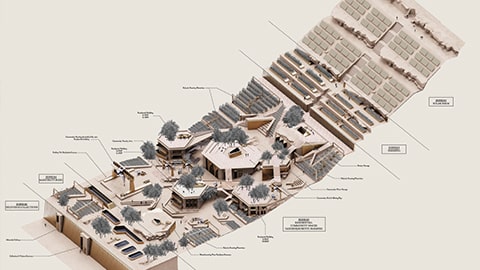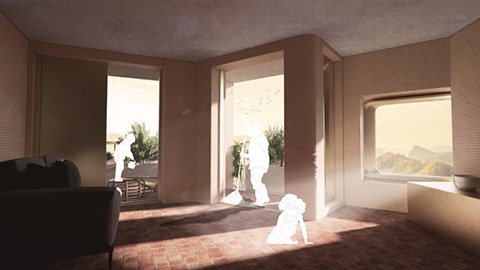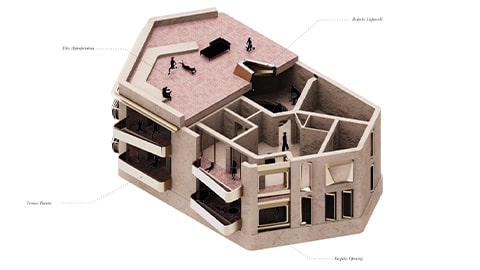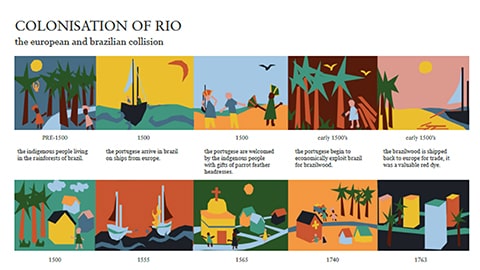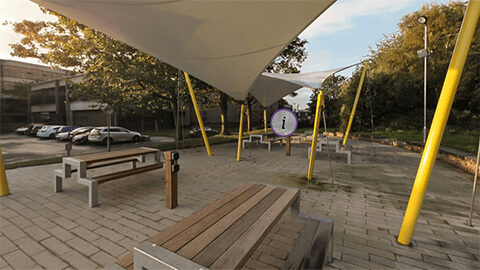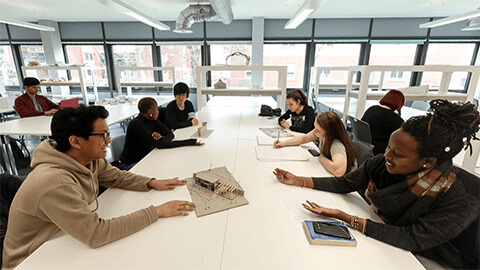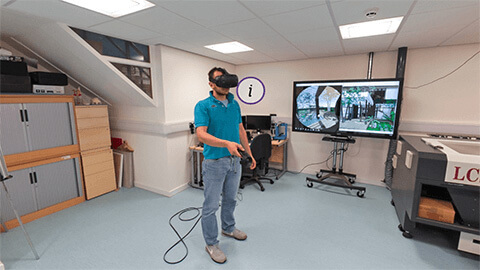Architecture BArch (Hons) degree
4 years full-time with placement year
- Typical offer
- AAA Entry requirements
- Fees for 2026-27 (per academic year)
-
UK: £9,790International: £30,700Fees
- UCAS code
-
K101
- Start date
- September 2026
- Institute code
- L79
- Subject area
- Architecture, Building and Civil Engineering
Overview
Our innovative Architecture course aims to nurture creative design leaders who flourish in architectural practice, with first-rate communication and management skills, as well as multidisciplinary knowledge and abilities. It aims to produce exceptional architects through an education that is immersed in hands-on experiences.
Architects are involved in the planning and design of the buildings and spaces we inhabit. Architecture is everywhere and brings together many fields of human endeavour, including art, history, physics, engineering, and more.
Our Architecture undergraduate degree is an innovative course founded on Loughborough's 100 years of 'theory and practice' culture to foster learning in both the University and the workplace. The Architecture degree will allow you to study with allied courses in the School and wider University to mimic real-life work scenarios. More specifically, the Architecture degree exploits our internationally-renowned expertise across the built environment disciplines, including construction, engineering, and building energy. A significant part of the Architecture degree is studio-based, supported by a dedicated team of architectural practitioners.
Every year, we hold an End of Year Show to celebrate the year’s achievements and showcase student work to practitioners interested in hiring our students and graduates.
The course will exempt you from the Royal Institute of British Architects (RIBA) Part I exam. Transfer onto our extended MArch programme may be possible upon completion of this degree to take a step towards becoming a Chartered Architect.
Changes to UK architecture accreditation
Loughborough University will be introducing a new Integrated Master’s degree from 2027, which will replace the traditional route to gain professional accredited architect status.
Although we are still open for 2026 entry to this course, we wanted to make you aware of the upcoming changes to UK architecture accreditation.
Why you should choose us
*based on data from the National Student Survey 2025. All underpinning survey responses that contribute to this can be found on the OfS website.
Why you should study this course
If you are interested in how buildings and their environment can be designed to improve our well-being and comfort, then Architecture at Loughborough is a stimulating and rewarding study option.
- Several leading architectural practices are actively engaged in the course through course content, field trips and guest lectures
- This course will set you apart from most graduates because it has been created as a direct response to the changing needs of architectural practice
- This course enables you to work in industry for a year on an approved placement, leading to a Diploma in Professional Studies (DPS)
- This course comes with the option to study abroad for a year, at the end of which you will gain a Diploma in International Studies (DIntS)
- It is a unique opportunity to study and learn in an integrated School, leading to various group projects with students from other courses within the School that mimic real life work scenarios
- The School has an outstanding graduate employment record, with graduates working at leading national and international companies
- Every year, we hold an End of Year Show to celebrate the year’s achievements and showcase student work to practitioners interested in hiring our students and graduates
- The theories you will learn will be supported by laboratory experiments and real-life design problems
- The course is accredited by the Royal Institute of British Architects (RIBA)
Professional recognition
This degree is accredited by the Royal Institute of British Architects (RIBA).
The visiting boards commended the School for its innovative pedagogy, and investment in facilities and staff, including dedicated studio space, collegiality and enthusiasm of staff and personalised student experience.
What you'll study
For a taster of what you can expect to study on our Architecture BArch degree, take a sneak preview of some of the modules you may have the opportunity to study below.
The information below is intended as an example only, featuring module details for the current year of study. Modules are reviewed on an annual basis and may be subject to future changes – revised details will be published through Programme Specifications ahead of each academic year. Please also see Terms and Conditions of Study for more information.
Semester 1 & 2
Compulsory
Design Studio A
Aims of this module are to:
- Develop core studio skills and good habits as a culture of critical collaboration; e.g. time management, organisation, teamwork, independent working.
- Explore spatial and architectural language through making, enabling an enhanced perspective of physical and meta-physical worlds.
- Investigate architectural qualities such as light, scale and proportion.
- Foster an appreciation of conceptual approaches to design.
- Consider the fundamental architectural relationships between space, human, activity and place.
- Examine the design brief through a series of design investigations.
- Apply a range of graphical and modelling techniques to represent their design intent.
Design Skills
The aims of this module are for students to:
- Enhance skills of observation, documentation and communication of characteristics of the material world that surrounds us.
- Demonstrate the use of a range of 2D and 3D manual and digital architectural representational techniques as a foundation to selecting appropriate forms of representation to communicate design intent in design studio.
- Engage in a series of design tasks to familiarise students with developing clear design concepts and narratives.
- Produce simple technical architectural drawings conforming to industry drawing conventions.
- Utilise a variety of visual and graphic methods of design analysis and synthesis to engender critical thinking and self-reflection.
A part aim for this module is to enable students to become aware of and develop their academic, professional and personal skills through Personal Best. Personal Best is a development programme available to all students at Loughborough University. Support and guidance are provided to all Part A students to engage with skills and personal development through lectures and a dedicated app.
Tectonics 1 - An Introduction to Materials, Structure & Construction
The aims of this module are for students to:
- Develop knowledge and understanding of the materials commonly used in construction projects; including an appreciation of their fundamental properties, their historic evolution, architectural importance and the conditions they are expected to accommodate.
- Appreciate basic principles of structural design and how these relate to architectural form and construction materials.
- Become familiar with fundamental types of building elements, building technologies and basic construction methods.
- Work independently and in a group on design problems and research-based activities.
Building Science
The aims of this module are for students to:
- Acquire a broad knowledge of Building Science and in particular the fundamental skills needed to consider the environmental design of buildings.
- Discuss the influence of external climate on buildings and the role materials, form and construction can play on the environmental performance of buildings as a 'climatic modifier'.
- Examine environmental factors that influence human comfort (thermal, visual, acoustic and air quality) and how buildings can passively and actively be designed to modify these conditions - from vernacular precedents to modern technologies.
- Explore low energy and zero carbon design as integral design strategies.
This knowledge will prepare the student for contemporaneous design studies in Part A and for increasingly sophisticated design projects in Part B and thereafter.
Architectural History
The aims of this module are for students to:
- Acquire a broad knowledge of the history of architecture from prehistory through to the present as a reflection of stylistic, technological, social and theoretical influences and developments.
- Gain an understanding of architecture in different areas of the world in comparison to the European canon.
- Appreciate the creative interrelation of fine art, literature, philosophy, design and architecture.
- Explore research methods and techniques of observational and spatial analysis to critically review buildings and establish their histories.
This knowledge will prepare the student for Part B module Critical Theory (CVB078) where a critical approach to architectural theory will be taught.
Semester 1 & 2
Compulsory
Design Studio B
The aims of this module are for students to:
- Build upon the knowledge and skills gained in Part A with projects of increasing scope and complexity that offer a variety of programmes and contexts for student learning.
- Improve their ability of translating ideas into spatial forms by working on projects of small to medium scale in context, with particular attention to issues of experiential and tectonic qualities.
- Integrate design ideas with architectural craftsmanship by emphasising the importance of design details, construction sequences and the relational dependencies between building elements.
- Apply building science principles and analysis to a set of design projects in regards to critical spatial inquiry on the relations of energy and space to understand, critique, and ultimately influence choices regarding energy options.
- Acquire an understanding and appreciation for the unique social and physical context for which they are designing.
- Explore qualities of public and private space.
- Develop a self-reflective approach to practice and document this as part of their personal learning experience.
- Employ collaborative practices and professional perspectives in cross disciplinary teams to plan and deliver a project.
Advanced Design Skills
This module builds on the knowledge and skills acquired in the Design Skills module (CVA056) taken in first year.
The aims of this module are for students to:
- Apply fundamental concepts and techniques in computational design.
- Fabricate component-based design using digital techniques.
- Develop basic BIM skills.
- Practice advanced forms of digital representation including virtual and augmented reality.
Advanced Technical Investigations
This module builds on the knowledge and principles acquired in the architectural technology module (A3) taken in first year.
The aims of this module are for students to:
- Reinforce previously learned structural principles and construction knowledge through exploratory design applications.
- Explore technology as a principal driver of form through practical and innovative applications of structural forms, envelope design and environmental technologies utilising hand-made and digital models.
- Use digital tools to conduct analysis to investigate (simulate) structural design proposals and the environmental performance of proposed building designs.
Critical Theory
The aims of this module are for students to:
- Build upon the knowledge of the history of architecture learnt in module CVA059 through critical engagement with architectural theory and philosophy, as well as to be introduced to key aspects of urban theory.
- Explore and interrogate the theories of important architects and commentators in the modern through to contemporary period.
- Consider the general relevance and uses of theory and the interface between theory and practice.
- Understand the applicability of theories at different scales, including the fundamentals of urban theory and the discourse of city morphology.
- Understood the tropes and agendas of different types of theory, from philosophical disquisition through to pithy manifesto.
- Develop the ability and confidence to explain, appraise and critique theory and to formulate, present and defend their own theoretical approaches.
Design in Context
The aims of this module are for students to:
- Explore the context of Architecture as a discipline within the wider industries of property and construction.
- Introduce the role of the architect within the design team and the critical aspects of leadership, motivation, teamwork and ethical practice.
- Gain an understanding of the benefits of working with others and the importance of leading the engineering and other disciplines through the process of architectural design.
- Examine construction procurement methods and project organisational structures.
- Develop an understanding of continuous professional development and meet contemporary demands of sustainable outcomes and professional practice.
Semester 1 & 2
Compulsory
Design Studio C
The aims of this module are for students to:
- Apply the knowledge and skills gained in Parts A, B and I to projects of increasing scope and complexity and offer a variety of programmes and contexts for student learning.
- Enhance their technical skills to produce a complete set of architectural drawings that illustrate all aspects of a building and communicate a sound understanding of the building's technical performance.
- Explain their awareness of the complex relationship between external form and interior space by proposing a group of buildings and their surrounding external spaces to engage issues of scale and landscape detailing.
- Articulate a personal approach to architecture, establishing ownership of their own design process through a comprehensive exploration of a design problem and ability to organize a personal programme of work to meet deadlines.
- Evaluate the impact of their proposed design on existing and proposed communities.
- Integrate their design aspiration with conflicting social, economic and environmental demands in a global and local context in relationship to the client, user and public.
Design Interventions
The aims of this module are for students to:
- Familiarise themselves with specification writing.
- Be introduced to the added complexities of working with existing buildings.
- Experience presenting to a real client and working in a community environment.
- Apply technical and environmental solutions to improve the performance/conditions of an existing building.
Research Dissertation
The aims of this module are for students to:
- Demonstrate an understanding of the role of research to overcome knowledge gaps and to interrogate interpretative assumptions.
- Synthesize data/information from a number of sources in order to gain a coherent understanding of a research problem.
- Undertake the process of research by assuming individual responsibility to define and study a topic in a specialized area relating to architecture, including selection of an appropriate research method.
- Present rational arguments and draw independent conclusions based on a rigorous approach to collecting, analyzing and interpreting a proportionate amount of quantitative and/or qualitative data/information, whether numerical, discursive, theoretical, visual or spatial.
The Business of Architecture
The aim of this module is to develop students' knowledge and understanding of the professional practice of architecture and how architectural business fits in to the wider society. The module covers a broad range of professional responsibilities for architects, including legal framework and processes, business administration, delivery of architectural services. It situates the architectural practice within the context of global challenges and develops a future ready architect that is sensitive to ethical, safety, environment and cultural requirements.
How you'll study
- Lectures
- Seminars
- Tutorials
- Field trips
- Independent study
- Group work
- Supervision
- Workshops
- Laboratory work
- Design studio
- Practical sessions
How you'll be assessed
Lecture-based modules are assessed by a variety of coursework, such as sketchbooks, illustrated essays, precedent studies, physical and digital models, technical reports, and presentations.
Some first year modules include a written exam. Studio work is primarily assessed through portfolio submission. In addition, regular and student-focused feedback is provided through pin-ups, design critics, and tutorials.
Placement year
Our Architecture course is structured to include a placement year of paid work in industry after your second year of study. Most placements are fully salaried, with typical salaries from £17,000 to £22,000.
You will be supported by dedicated staff in securing a placement that best suits your skills and professional aspirations. This year of practical experience gives you a clearer understanding of the industry to help with the later stages of your studies and deciding your future career direction.
During the placement year, your employer will nominate an experienced member of their team who will supervise you. You will also be visited by your University tutor at your place of work and will be required to write reports on your progress and experience.
Please note that whilst the Department offers great support for students to find a placement, it is ultimately the student's responsibility to source and secure their industrial placement.
Study abroad
If you are interested in travelling whilst you study, there are options to study overseas with our partner universities. By choosing this course you'll have the option to take advantage of this exciting opportunity, giving you the chance to not only experience new cultures and visit exciting destinations, but also to expand your learning experience. The length of a study abroad placement would be confirmed by your School or Department.
Additional award
This course comes with the option to study abroad for a year, at the end of which you will gain a Diploma in International Studies (DIntS). This is an additional award to the final qualification you will receive once you have successfully completed this course.
Students' project work
Where you'll study
Our Architecture degree has its own dedicated building, the Keith Green Building, where students have their own workspace to conduct their studies. It will be a ‘living’ laboratory with the tint of the SW glazing responding to light and thermal sensors and occupant experience to give you a first-hand understanding of how the building responds to the environment it is in.
The building fronts an open green space, the Archi-quad, which will operate as an interactive test ground for architectural interventions. Students on our Architecture course will be fully prepared and trained for a career as an architect.
You will also have access to our 3,000m2 open-plan laboratory, where you will test and explore ideas using traditional workshops, digital fabrication tools and research labs. Modelling materials will be provided for all prescribed projects to support workshop-based learning.
Entry requirements
To learn more about the qualifications we typically accept, please select your country from the drop-down menu below.
United Kingdom
- Typical A level offer
-
AAA (No specific subject requirements but a mix of Science, Art and Humanities subjects is preferred)
- Typical IB offer
-
37 (6,6,6 HL)
- Typical BTEC offer
-
BTEC Level 3 National Extended Diploma in a relevant subject: D*DD
BTEC Level 3 National Diploma: DD plus one A level at Grade A
BTEC Level 3 National Extended Certificate: D plus two A levels at Grades AA
Preferred BTEC: Engineering, Art and Design, Construction or Applied Science
- GCSE
-
GCSE Maths and English Language grade 4/C
- Access Loughborough Contextual Offer
-
A level: ABB
A level and BTEC Level 3 National Extended Certificate: BB and Distinction
We make lower grade offers to students who may face barriers to university study. Check out the eligibility criteria for receiving an Access Loughborough Contextual Offer.
If you don’t meet the Access Loughborough eligibility criteria but have circumstances that may have impacted your academic achievements, then we may take this into account when considering your application. Check out our Contextual Admissions Policy for what we consider and how it may be used.
- Other
-
We also accept many other qualifications in addition to those outlined above and further information about these can be found in our general entry requirements.
Selection
Applicants are selected on the basis of their UCAS application, and also a portfolio submission and interview in order to assess academic potential beyond that provided as part of the application. An interview also gives applicants the opportunity to visit the School, meet staff and students, see facilities and get an insight into what it is like to be a student at Loughborough.
We have created this guidance to help all applicants navigate the portfolio and interview process.
Many of our courses receive a large number of applications for each available place. We cannot unfortunately always make offers to all applicants who are predicted to achieve/have achieved grades in line with our advertised typical offers.
Australia
Typical offers for students from Australia are based on the Australian Tertiary Admissions Rank (ATAR). Typically, we would require a score between 85.00 and 94.00. For students from Queensland, requirements from the Overall Position (OP) would typically be between 8 and 4.
Further to the above, students would normally be required to pass one of the following qualifications:
- ACT Year 12 Certificate
- New South Wales Higher School Certificate (HSC)
- Northern Territory Certificate of Education (NTCE)
- Queensland Certificate of Education (QCE)
- South Australian Certificate of Education (SACE)
- Tasmanian Certificate of Education (TCE)
- Victorian Certificate of Education (VCE)
- Western Australian Certificate of Education (WACE)
Where courses have specific subject requirements, these will be expected to be studied within one of the above qualifications. Grades of ‘B’ (ACT, NTCE, SACE, VCE, WACE), ‘4’ (HSC), ‘CA’ (TCE), ‘HA’ (QCE) or higher will normally be required.
English language studied within one of the above qualifications is normally sufficient to meet the university’s minimum entry requirements. Please see the Approved Qualifications table on the English Language page for further details.
Austria
For students taking the Austrian Reifeprüfung (Matura), we typically require an average score between 2.2 and 1.2 from 6 written or spoken exams. Where courses have specific subject requirements, a score of 2 or 1 will normally be required in each.
English language studied within the above qualification is normally sufficient to meet the university’s minimum entry requirements. Please see the Approved Qualifications table on the English Language page for further details.
Bahrain
Students who have studied the Tawjihiyah/Thanawiya amma (General Secondary Education Certificate) will need to complete a suitable Foundation Year.
Loughborough University offers a Foundation Year through ONCAMPUS. You can view the entry requirements for this on the ONCAMPUS webpage. Alternatively, please contact our Global Engagement team to check if the Foundation Programme that you are considering taking is acceptable for entry to Loughborough courses.
Students with A Level or IB qualifications will be considered for direct entry to undergraduate degree courses. Please see the undergraduate prospectus for specific course requirements. Requirements for American SATs and APs can be found under the country requirements for the USA.
All students must also achieve the University’s English language requirements
Bangladesh
Students taking the Higher Secondary Certificate (HSC) will need to complete a suitable Foundation Year.
Loughborough University offers a Foundation Year through ONCAMPUS. You can view the entry requirements for this on the ONCAMPUS webpage. Alternatively, please contact our Global Engagement team to check if the Foundation Programme that you are considering taking is acceptable for entry to Loughborough courses.
Students with A Level or IB qualifications will be considered for direct entry to undergraduate degree courses. Please see the undergraduate prospectus for specific course requirements.
All students must also achieve the University’s English language requirements.
Belgium
The Certificat d’Enseignement Secondaire Supérieur (CESS) and Diploma van Secundair Onderwijs (DSO) are both acceptable qualifications for direct entry into first year undergraduate courses. We typically require an overall score ranging from 75% to 85%. Where the 20 point marking scale is used, we would typically require marks between 15/20 and 17/20.
Specific subject marks may be required for some courses and where this is the case, this should be studied as a 4-hour subject. Where courses require achievement in GCSE Maths, we would normally look for a score of 50% or higher in Maths within the CESS or DSO.
Students currently studying the Abschlusszeugnis der Oberstufe des Sekundarunterrichts should contact the Undergraduate Admissions Office for further details.
English language studied within one of the above qualifications is normally sufficient to meet the university’s minimum entry requirements. Please see the Approved Qualifications table on the English Language page for further details.
Brazil
Students taking the Brazilian High School Certificate(Certificado de Ensino Médio and Exame Nacional do Ensino Médio – ENEM) will need to complete a suitable Foundation Year.
Loughborough University offers a Foundation Year through ONCAMPUS. You can view the entry requirements for this on the ONCAMPUS webpage. Alternatively, please contact our Global Engagement Team to check if the Foundation Programme that you are considering taking is acceptable for entry to Loughborough courses.
Students with A Level or IB qualifications will be considered for direct entry to undergraduate degree courses. Please see the undergraduate prospectus for specific course requirements.
All students must also achieve the University’s English language requirements.
Brunei
Students with A Level or IB qualifications will be considered for direct entry to undergraduate degree courses. Please see the undergraduate prospectus for specific course requirements.
All students must also achieve the University’s English language requirements.
Bulgaria
For students taking the Diploma za Sredno Obrazovanie, we would typically ask for an overall score ranging from 5.3 - 6.0 overall with specific subject marks required for some courses.
Where courses require achievement in GCSE Maths, we would normally look for a score of 4.5 or higher in Maths within the Diploma za Sredno Obrazovanie.
All students must also achieve the University’s English language requirements.
Canada
Typical offers for students from Canada are based on having completed Grade 12. The information below outlines the requirements for different states:
Alberta, Northwest Territory, Nunavut
- Typical offers are based on an average of best 5 grade 12 courses in the General High School Diploma and offers typically range from 80% - 93%.
- Where courses require specific subjects, these should be taken as thirty-level courses. Where A Level Maths is a course requirement, both Mathematics 30-1 and Mathematics 30-2 should be completed.
- Where courses require achievement in GCSE Maths, we would normally look for a score of 60% or higher in grade 10 Maths.
British Columbia, Yukon Territory
- Typical offers range from ‘BBBBBB’ – ‘AAAAAA’ from best 6 grade 12 subjects in the Senior Secondary Graduation Diploma.
- Where courses require specific subjects these would normally need to be achieved at ‘A’ or ‘B’.
- Where courses require achievement in GCSE Maths, we would normally look for a score of ‘C’ or higher in grade 10 Maths.
Manitoba
- Typical offers are based on an average of best 5 subjects at 300 level in the High School Graduation Diploma and offers typically range from 80% - 93% with specific subject marks required for some courses.
- Where courses require achievement in GCSE Maths, we would normally look for a score of 60% or higher in grade 10 Maths.
New Brunswick, Prince Edward Island, Quebec, Saskatchewan
- Typical offers are based on an average of best 5 grade 12 subjects in the High School Graduation Diploma and offers typically range from 80% - 93% with specific subject marks required for some courses. Where courses require achievement in GCSE Maths, we would normally look for a score of 60% or higher in grade 10 Maths.
Newfoundland & Labrador
- Typical offers are based on an average of best 5 university preparatory level subjects in the High School Graduation Diploma and offers typically range from 80% - 93% with specific subject marks required for some courses.
- Where courses require achievement in GCSE Maths, we would normally look for a score of 60% or higher in grade 10 Maths.
Nova Scotia
- Typical offers are based on an average of best 5 subjects at level 4 or 5 in the High School Completion Certificate and offers typically range from 80% - 93% with specific subject marks required for some courses.
- Where courses require achievement in GCSE Maths, we would normally look for a score of 60% or higher in grade 10 Maths.
Ontario
- Typical offers are based on an average of best 6 grade 12 courses at ‘4U’, ‘4M’ or ‘DU’ in the Ontario Secondary School Diploma and offers typically range from 80% - 93% with specific subject marks required for some courses.
- Where courses require achievement in GCSE Maths, we would normally look for a score of 60% or higher in grade 10 Maths.
Quebec
- Typical offers range from 80% - 93% overall in the Diplome d'Etudes Collegiales with specific subject marks of 80% - 96% required for some courses.
- Where courses require achievement in GCSE Maths, we would normally look for a score of 60% or higher in grade 11 Maths.
English language studied within one of the above qualifications is normally sufficient to meet the university’s minimum entry requirements. Please see the Approved Qualifications table on the English Language page for further details.
China
Students taking the Senior Middle Examinations will need to complete a suitable Foundation Year.
Loughborough University offers a Foundation Year through ONCAMPUS. You can view the entry requirements for this on the ONCAMPUS webpage. Alternatively, please contact our Global Engagement team to check if the Foundation Programme that you are considering taking is acceptable for entry to Loughborough courses.
We will also accept a first year of study at a recognised university of appropriate standing within China as acceptable for entry to the first year of some of our degree courses. We would typically require an overall average ranging from 75% to 80% with specific subject marks required for some courses. Please contact the Global Engagement team who can advise on acceptability for entry to Loughborough courses.
All students must also achieve the University’s English language requirements.
Croatia
For students taking the Croatian Matura (Svjedodžba o Maturi), we typically require an average score between 4.0 and 5.0.
Where courses have specific subject requirements, a score of 4 or 5 will normally be required in each. For courses that require Maths as part of their A Level offer, this should be taken at extended level in the Matura.
All students must also achieve the University’s English language requirements.
Cyprus
The Apolytirion is not accepted for direct entry to the University when studied on its own. However, we are happy to consider students taking the Apolytirion alongside either 1 or 2 A Levels. For courses with typical offer requirements of ‘ABB’, we would typically require 19.5 in the Apolytirion alongside an ‘A’ at A Level or 18.0 in the Apolytirion alongside ‘AB’ at A Level. Where courses require specific subjects, these must be taken at A Level.
Where courses require achievement in GCSE Maths, we would normally look for a score of 17 or higher in Maths within the Apolytirion.
Students taking the Apolytirion without additional A Levels will need to complete a suitable Foundation Year. Loughborough University offers a Foundation Year through ONCAMPUS. You can view the entry requirements for this on the ONCAMPUS webpage. Alternatively, please contact our Global Engagement team to check if the Foundation Programme that you are considering taking is acceptable for entry to Loughborough courses.
All students must also achieve the University’s English language requirements.
Czech Republic
For students taking the Czech Maturita (Vysvědčení o Maturitní Zkoušce), we typically require an average ranging from 2.00 to 1.00 from best 4 subjects with specific subject marks (either 1 or 2) required for some courses.
All applicants must also achieve the University’s English language requirements.
Denmark
For students taking the Bevis for Studentereksamen (STX), typical offers range from 8.0 to 10.5 in the weighted average mark from the STX. Some courses may require marks (either 10 or 12) in specific Level A subjects.
Where courses require achievement in GCSE Maths, we would normally look for a score of 7 or higher in Level C Maths with the STX.
Students who have taken the Studentereksamen under the old grading system would be considered on a case by case basis with an average between 9.0 and 11.0 normally required.
English language studied within one of the above qualifications is normally sufficient to meet the university’s minimum entry requirements. Please see the Approved Qualifications table on the English Language page for further details.
Egypt
Students who have studied the Thanaweya A’ama (Certificate of General Secondary Education) will need complete a suitable Foundation Year.
Loughborough University offers a Foundation Year through ONCAMPUS. You can view the entry requirements for this on the ONCAMPUS webpage. Alternatively, please contact our Global Engagement team to check if the Foundation Programme that you are considering taking is acceptable for entry to Loughborough courses.
Students with A Level or IB qualifications will be considered for direct entry to undergraduate degree courses. Please see the undergraduate prospectus for specific course requirements. Requirements for American SATs and APs can be found under the country requirements for the USA.
All students must also achieve the University’s English language requirements.
Estonia
For students taking the Gümnaasiumi lõputunnistus with the Riigieksamitunnistus, we typically require a high average grade between 4.3 and 4.8 in the Gümnaasiumi lõputunnistus as well as an average percentage between 77% and 90% in the Riigieksamitunnistus.
Specific subject marks may be required for some courses. For Engineering and Science courses, we would expect students to have studied Lai Matemaatika.
Students with a score of 4.0 with 70% average from state exams would be considered on a case by case basis for the Loughborough University Foundation Year
All students must also achieve the University’s English language requirements.
European Baccalaureate
For students taking the European Baccalaureate, we typically require an overall average mark between 78% and 88% with specific subject marks (normally 8.0 or higher from a 4 or 5 period subject) required for some courses.
Where courses require achievement in GCSE Maths, we would normally look for a score of 6.5 or higher in Maths 3.
English language studied within the above qualification is normally sufficient to meet the university’s minimum entry requirements. Please see the Approved Qualifications table on the English Language page for further details. When applying, please state whether you are taking English as Language 1, 2, 3 or 4.
Faroe Islands
Students taking the Studentsprógv would normally be required to achieve a score between 8.0 and 10.5 with specific subject marks (either 10 or 12) required for some courses.
All students must also achieve the University’s English language requirements.
Finland
For students taking the Ylioppilastutkinto / Studentexamen, typical offer requirements would normally be based on achievement in best 4 subjects. Offers will typically be expressed as four letter grades ranging from MMMM (achieve Magna cum laude approbatur or higher in four subjects) to LEEE (achieve Eximia cum laude approbatur or higher in four subjects with at least one subject at Laudatur).
Where courses require achievement in GCSE Maths, we would normally look for a score of 7 or higher in Maths within the Lukion Päästötodistus
All students must also achieve the University’s English language requirements.
France
For students taking the new French Baccalauréat Général (assessed from 2021 onwards), we typically require an overall result between 13.0 – 15.5 with results of 14-15 in two speciality subjects. Specific speciality subjects are required for some courses.
Students following the Option Internationale (OIB) will often receive a slightly lower offer.
Where courses require achievement in GCSE Maths, we would normally look for a score of 10 or higher in Mathematics taken in Year 12 as a Speciality Subject (Première) or a score of 11 or higher in Additional Maths taken as an Option in Year 13 (Terminale).
Students taking the Baccalauréat Technologique will be considered for first year entry on a case by case basis where subjects studied are relevant to the university course applied for.
English language studied within one of the above qualifications is normally sufficient to meet the university’s minimum entry requirements. Please see the Approved Qualifications table on the English Language page for further details.
Germany
Students taking the Abitur typically require an overall score ranging from 1.3 - 2.0 with specific subject marks required for some courses (normally between 12and 15).
Where courses require achievement in GCSE Maths, we would normally look for a score of 7 or higher in Maths within the Abitur.
English language studied within the above qualification is normally sufficient to meet the university’s minimum entry requirements. Please see the Approved Qualifications table on the English Language page for further details.
Ghana
Students taking the WASSCE will need to complete a suitable Foundation Year.
Loughborough University offers a Foundation Year through ONCAMPUS. You can view the entry requirements for this on the ONCAMPUS webpage. Alternatively, please contact our Global Engagement team to check if the Foundation Programme that you are considering taking is acceptable for entry to Loughborough courses.
Students with A Level or IB qualifications will be considered for direct entry to undergraduate degree courses. Please see the undergraduate prospectus for specific course requirements.
All students must also achieve the University’s English language requirements.
Greece
Students taking the Greek Apolyterion are normally required to also take the Panhellenic Exams. Typical offers are based on the General Access Grade in the Panhellenics and range from 16.5 to 19.0 depending on the course applied for. Where courses have specific subject requirements, these should be taken as ‘Direction’ subjects within the Panhellenics. Students applying for Science or Engineering courses would generally be expected to have followed the Sciences direction. We will also normally ask for a mark between 17.0 and 19.0 in the Apolyterion certificate.
Students who have studied 1 or 2 A Levels alongside the Apolyterion (without taking the Panhellenic Exams) would normally be required to obtain high grades in their A Level exams along with an average mark of between 17.0 and 19.0 in the Apolyterion. Where courses have specific subject requirements, these should be taken as A Levels.
Students taking a Foundation course alongside the Apolyterion will be considered on a case by case basis.
Loughborough University offers a Foundation Year through ONCAMPUS. You can view the entry requirements for this on the ONCAMPUS webpage. Alternatively, please contact our Global Engagement team to check if the Foundation Programme that you are considering taking is acceptable for entry to Loughborough courses.
All students must also achieve the University’s English language requirements.
Hong Kong
Typical offers for students taking the HKDSE vary by course and range from ‘5, 4, 4’ – ‘5*, 5, 5’ from best 3 subjects, of which 2 must be electives and excluding Liberal Studies and Chinese. Where courses require specific subjects, we would be looking for grades between ‘4’ and ‘5*’ in these subjects.
For courses that require Maths as part of their A Level offer, this should be taken at extended level in the HKDSE. Where courses require achievement in GCSE Maths, we would normally look for a score of ‘3’ or higher in core Maths.
Students with A Level or IB qualifications will be considered for direct entry to undergraduate degree courses. Please see the undergraduate prospectus for specific course requirements.
English language studied within one of the above qualifications is normally sufficient to meet the university’s minimum entry requirements. Please see the Approved Qualifications table on the English Language page for further details.
Hungary
For students taking the Hungarian Matura (Érettségi Bizonyítvány), we typically require an average ranging from 70% to 83% from best 5 subjects which must include at least 2 higher level exams.
Where courses have specific subject requirements, a score of between 70% and 90% would normally be required in a higher level exam.
All students must also achieve the University’s English language requirements.
Iceland
For students taking the Stúdentspróf, we typically require an overall grade between 8.0 and 9.3 with specific subject marks (between 8 and 10) required for some courses.
English language studied within the above qualification is normally sufficient to meet the university’s minimum entry requirements. Please see the Approved Qualifications table on the English Language page for further details.
India
Typical offers are based on the Standard XII school leaving qualifications. When awarded by CBSE, ISCE or West Bengal Exam Boards, we typically ask for results in the region of 78% - 88% average performance from best 4 subjects. For other state boards, we would be looking for achievement between 83% - 93% from best 4 subjects. Specific subject marks at Standard X or Standard XII may be required for some courses.
Students with A Level or IB qualifications will be considered for direct entry to undergraduate degree courses. Please see the undergraduate prospectus for specific course requirements.
English language studied within one of the above qualifications is normally sufficient to meet the university’s minimum entry requirements. Please see the Approved Qualifications table on the English Language page for further details.
Indonesia
Students who have studied the Ijazah: Sekolah Menengah Atas/Madrasah Aliyah (SMA/MA) will need complete a suitable Foundation Year.
Loughborough University offers a Foundation Year through ONCAMPUS. You can view the entry requirements for this on the ONCAMPUS webpage. Alternatively, please contact our Global Engagement team to check if the Foundation Programme that you are considering taking is acceptable for entry to Loughborough courses.
Students with A Level or IB qualifications will be considered for direct entry to undergraduate degree courses. Please see the undergraduate prospectus for specific course requirements.
All students must also achieve the University’s English language requirements.
Ireland
Students who have taken the Leaving Certificate under the new grading system (post 2016) would normally be required to achieve 5 higher level passes with grades ranging from H2 H2 H3 H3 H3 to H1 H1 H2 H2 H2. Where courses have specific A Level subject requirements, these should be taken at higher level.
If you have taken the Leaving Certificate under the old grading system (pre-2016) our typical offers would be between B1 B1 B2 B2 B2 and A1 A1 A2 A2 A2.
English language studied within the above qualification is normally sufficient to meet the university’s minimum entry requirements. Please see the Approved Qualifications table on the English Language page for further details.
Israel
For students taking the Bagrut, we would require students to have studied at least 21 study units. Typical offers will be based on average percentage from 3 best 5-unit level subjects with requirements ranging from 78% to 92% depending on the course. Please note that we do not use the Optimal Average and do not consider bonus points as part of our offers.
Where courses have specific subject requirements, we would expect these to be studied as a 5-unit subject and look for achievement between 80% and 95%.
All students must also achieve the University’s English language requirements.
Italy
For students taking the Diploma di Esamo di Stato, we typically require an overall score ranging from 85% - 98% overall. Where courses require specific subjects, we would be looking for marks between 8 and 10 in school assessment.
Where courses require achievement in GCSE Maths, we would normally look for a score of 6 or higher in school assessment for Maths.
Students taking the Diploma di Istituto Tecnico will be considered for first year entry on a case by case basis where subjects studied are relevant to the course for which they have applied.
All students must also achieve the University’s English language requirements.
Japan
Students taking the Kotogakko Sotsugyo Shomeisho (Upper Secondary School Leaving Certificate) will need to complete a suitable Foundation Year
Loughborough University offers a Foundation Year through ONCAMPUS. You can view the entry requirements for this on the ONCAMPUS webpage. Alternatively, please contact our Global Engagement team to check if the Foundation Programme that you are considering taking is acceptable for entry to Loughborough courses.
We will also accept a first year of study at a recognised university of appropriate standing within Japan as acceptable for entry to the first year of some of our degree courses. We would typically require an overall average ranging from 75% to 80% with specific subject marks required for some courses. Please contact the Global Engagement team who can advise on acceptability for entry to Loughborough courses.
Students with A Level or IB qualifications will be considered for direct entry to undergraduate degree courses. Please see the undergraduate prospectus for specific course requirements.
All students must also achieve the University’s English language requirements.
Jordan
Students taking the Tawjihi (General Secondary Education Certificate) will need to complete a suitable Foundation Year.
Loughborough University offers a Foundation Year through ONCAMPUS. You can view the entry requirements for this on the ONCAMPUS webpage. Alternatively, please contact our Global Engagement team to check if the Foundation Programme that you are considering taking is acceptable for entry to Loughborough courses.
Students with A Level or IB qualifications will be considered for direct entry to undergraduate degree courses. Please see the undergraduate prospectus for specific course requirements. Requirements for American SATs and APs can be found under the country requirements for the USA.
Students must also achieve the University’s English language requirements.
Kazakhstan
Typical offers for students from Kazakhstan are based on the Nazarbayev Intellectual Schools (NIS) Grade 12 Certificate. Typically, we would require a score between AAA and BBB from Advanced level subjects. Where courses have specific subject requirements, these will be expected to be studied at Advanced level.
English language studied within the Nazarbayev Intellectual Schools (NIS) Grade 12 Certificate is not sufficient to meet the university’s minimum entry requirements. Please see the Approved Qualifications table for further details.
Kenya
Students taking the Kenya Certificate of Secondary Education will need to complete a suitable Foundation Year.
Loughborough University offers a Foundation Year through ONCAMPUS. You can view the entry requirements for this on the ONCAMPUS webpage. Alternatively, please contact our Global Engagement team to check if the Foundation Programme that you are considering taking is acceptable for entry to Loughborough courses.
Students with A Level or IB qualifications will be considered for direct entry to undergraduate degree courses. Please see the undergraduate prospectus for specific course requirements.
English language studied within the above qualifications is normally sufficient to meet the university’s minimum entry requirements. Please see the Approved Qualifications table on the English Language page for further details.
Kuwait
Students who have studied the Tawjihiyah/Thanawiya amma (General Secondary Education Certificate) will need to complete a suitable Foundation Year.
Loughborough University offers a Foundation Year through ONCAMPUS. You can view the entry requirements for this on the ONCAMPUS webpage. Alternatively, please contact our Global Engagement team to check if the Foundation Programme that you are considering taking is acceptable for entry to Loughborough courses.
Students with A Level or IB qualifications will be considered for direct entry to undergraduate degree courses. Please see the undergraduate prospectus for specific course requirements. Requirements for American SATs and APs can be found under the country requirements for the USA.
All students must also achieve the University’s English language requirements.
Latvia
For students taking the Atestāts par Vispārējo Vidējo Izglītību, we typically require a high average grade between 9.2 and 10.0 as well as an average between 87% and 95% from best 4 state exams.
Where courses have specific subject requirements, a score between 87% and 95% will normally be requested in state exams in these subjects.
Students with a score of 8.0 with 80% average from best 4 state exams would be considered on a case by case basis for the Foundation Year.
All students must also achieve the University’s English language requirements.
Lebanon
Students taking the Baccalauréat Général will need to complete a suitable Foundation Year.
Loughborough University offers a Foundation Year through ONCAMPUS. You can view the entry requirements for this on the ONCAMPUS webpage. Alternatively, please contact our Global Engagement team to check if the Foundation Programme that you are considering taking is acceptable for entry to Loughborough courses.
Students with A Level or IB qualifications will be considered for direct entry to undergraduate degree courses. Please see the undergraduate prospectus for specific course requirements.
Students must also achieve the University’s English language requirements.
Lithuania
For students taking the Brandos Atestatas, typical offers generally range from 9.0 – 10.0 overall. We would also typically ask for an average percentage from the best 3 state exams between 80% and 94%. Where courses require specific subjects, we would typically require these to be taken as state exams.
Where courses require achievement in GCSE Maths, we would normally look for a score of 7 or higher in school assessment for Maths.
All students must also achieve the University’s English language requirements.
Malaysia
For students taking either the Matrikulasi (Matriculation Certificate) or the Sigjil Tinggi Persekolahan Malaysian (STPM), we would typically require grades ranging from AAA-BBB from best 3 (core) subjects excluding general studies.
Where courses require achievement in GCSE Maths, we would normally look for a grade C or higher in SPM (Sijil Pelajaran Malaysia) Maths.
For students taking the Unified Examination Certificate (UEC) we would typically require from the best 7 subjects grades ranging 2xA1 5xA2 to 7xB3 in the UEC-SML. Where courses require achievement in GCSE Maths, we would normally look for a grade B6 or higher in Maths.
- Students taking the MARA Diploma will be considered for first year entry on a case by case basis.
- Students with A Level or IB qualifications will be considered for direct entry to undergraduate degree courses. Please see the undergraduate prospectus for specific course requirements.
English language studied within one of the above qualifications is normally sufficient to meet the university’s minimum entry requirements. Please see the Approved Qualifications table on the English Language page for further details.
Malta
For students taking the Advanced Matriculation Exam, typical offers would normally be based on achievement in 2 advanced level subjects (typically between BB and AA) and 3 intermediate level subjects excluding Systems of Knowledge (typically between BCC and AAA).
Where courses have specific subject requirements, a score of B or A will normally be required in an Advanced Level subject. Where courses require achievement in GCSE Maths, we normally look for a score of 4 or higher in Maths within the Secondary Education Certificate (SEC).
Students with A Level or IB qualifications will be considered for direct entry to undergraduate degree courses. Please see the undergraduate prospectus for specific course requirements.
English language studied within one of the above qualifications is normally sufficient to meet the university’s minimum entry requirements. Please see the Approved Qualifications table on the English Language page for further details.
Netherlands
For students taking the Voorbereidend Wetenschappelijk Onderwijs (VWO)., typical offers range from 6.6 to 7.4 average from the VWO with specific subject marks (between 7 and 9) required for some courses.
Students applying for Science or Engineering courses would generally be expected to have followed the Natuur en Techniek stream within the VWO and have taken the Maths D course.
Where courses require achievement in GCSE Maths, we would normally look for a score of 5 or higher in Maths within the VWO.
Students taking the Middelbaar Beroepsonderwijs (MBO Level 4) certificate will be considered for first year entry on a case by case basis where subjects studied are relevant to the university course applied for. Please contact the Undergraduate Admissions Office for further details.
English language studied within one of the above qualifications is normally sufficient to meet the university’s minimum entry requirements. Please see the Approved Qualifications table on the English Language page for further details.
New Zealand
For students taking the National Certificate in Educational Achievement (NCEA) Level 3 typical offers will be based on overall achievement in the NCEA plus a required number of credits achieved at the next level up. For example, where A Level requirements are ABB, we would normally require a Merit overall with 20 Level 3 credits achieved at Excellence.
Where courses have specific subject requirements, these should be studied at Level 3 within the NCEA. Typically, an overall achievement of Merit or Excellence will be required in these subjects.
English language studied within the above qualification is normally sufficient to meet the university’s minimum entry requirements. Please see the Approved Qualifications table on the English Language page for further details.
Nigeria
Students taking the WASSCE will need to complete a suitable Foundation Year.
Loughborough University offers a Foundation Year through ONCAMPUS. You can view the entry requirements for this on the ONCAMPUS webpage. Alternatively, please contact our Global Engagement team to check if the Foundation Programme that you are considering taking is acceptable for entry to Loughborough courses.
Students with A Level or IB qualifications will be considered for direct entry to undergraduate degree courses. Please see the undergraduate prospectus for specific course requirements.
English language studied within one of the above qualifications is normally sufficient to meet the university’s minimum entry requirements. Please see the Approved Qualifications table on the English Language page for further details.
Norway
For students taking the Vitnemål for Videregående Opplæring, typical offers range from 4.00 to 5.25 average of all Final Assessment Grades.
Where courses have specific subject requirements, students will need to achieve a 4 or higher in at least two 140-hour courses.
English language studied within the above qualification is normally sufficient to meet the university’s minimum entry requirements. Please see the Approved Qualifications table on the English Language page for further details.
Oman
Students who have studied the Tawjihiyah/Thanawiya amma (General Secondary Education Certificate) will need to complete a suitable Foundation Year.
Loughborough University offers a Foundation Year through ONCAMPUS. You can view the entry requirements for this on the ONCAMPUS webpage. Alternatively, please contact our Global Engagement team to check if the Foundation Programme that you are considering taking is acceptable for entry to Loughborough courses.
Students with A Level or IB qualifications will be considered for direct entry to undergraduate degree courses. Please see the undergraduate prospectus for specific course requirements. Requirements for American SATs and APs can be found under the country requirements for the USA.
All students must also achieve the University’s English language requirements.
Pakistan
Students taking the Intermediate/Higher Secondary School Certificate (HSSC) will need to complete a suitable Foundation Year.
Loughborough University offers a Foundation Year through ONCAMPUS. You can view the entry requirements for this on the ONCAMPUS webpage. Alternatively, please contact our Global Engagement team to check if the Foundation Programme that you are considering taking is acceptable for entry to Loughborough courses.
Students with A Level or IB qualifications will be considered for direct entry to undergraduate degree courses. Please see the undergraduate prospectus for specific course requirements.
All students must also achieve the University’s English language requirements.
Poland
For students taking the new Matura typical offers are based on average achievement from 3 extended level exams and offers normally range from 75% - 85%. Where courses require specific subjects, these should be taken as extended level exams and we would normally look for marks between 75% and 90%.
Where courses require achievement in GCSE Maths, we would normally look for a score of 68% or higher in the compulsory standard level Maths.
All students must also achieve the University’s English language requirements.
Portugal
Students taking the Diploma de Ensino Secundário would normally be required to achieve a score between 16 and 18 with specific subject marks (between 17 and 19) required for some courses.
Where courses require achievement in GCSE Maths, we normally look for a score of 14 or higher in Maths within the Diploma de Ensino Secundário.
All students must also achieve the University’s English language requirements.
Qatar
Students taking the Shahadat Al-Thanawaya Al-Aama (Senior School Certificate) will need to complete a suitable Foundation Year.
Loughborough University offers a Foundation Year through ONCAMPUS. You can view the entry requirements for this on the ONCAMPUS webpage. Alternatively, please contact our Global Engagement team to check if the Foundation Programme that you are considering taking is acceptable for entry to Loughborough courses.
Students with A Level or IB qualifications will be considered for direct entry to undergraduate degree courses. Please see the undergraduate prospectus for specific course requirements. Requirements for American SATs and APs can be found under the country requirements for the USA.
All students must also achieve the University’s English language requirements.
Romania
For students taking the Diploma de Bacalaureat, typical offers range from 8.6 – 9.4 overall. Where courses require a specific subject, we would be looking for this to be studied as the optional subject within the Diploma de Bacalaureat with marks between 8.6 and 9.8.
Where courses require achievement in GCSE Maths, we would normally look for a score of 7 or higher in Grade 10 Maths from the ‘Foaie Matricola’ or 6.5 or higher in Maths from the Diploma de Bacalaureat.
All students must also achieve the University’s English language requirements.
Russia
Students taking the Certificate of Unified State Examination will need to complete a suitable Foundation Year.
Loughborough University offers a Foundation Year through ONCAMPUS. You can view the entry requirements for this on the ONCAMPUS webpage. Alternatively, please contact our Global Engagement team to check if the Foundation Programme that you are considering taking is acceptable for entry to Loughborough courses.
Students with A Level or IB qualifications will be considered for direct entry to undergraduate degree courses. Please see the undergraduate prospectus for specific course requirements.
All students must also achieve the University’s English language requirements.
Saudi Arabia
Students who have studied the Tawjihiyah (General Secondary Education Certificate) will need to complete a suitable Foundation Year.
Loughborough University offers a Foundation Year through ONCAMPUS. You can view the entry requirements for this on the ONCAMPUS webpage. Alternatively, please contact our Global Engagement team to check if the Foundation Programme that you are considering taking is acceptable for entry to Loughborough courses.
Students with A Level or IB qualifications will be considered for direct entry to undergraduate degree courses. Please see the undergraduate prospectus for specific course requirements. Requirements for American SATs and APs can be found under the country requirements for the USA.
All students must also achieve the University’s English language requirements.
Singapore
For students with Singapore A Levels, typical offers normally range from BBC to AAA from three H2 Level subjects and offers are typically one grade lower than the typical A Level requirement as stated in the undergraduate prospectus due to the comparative difficulty.
Where courses have specific subject requirements, an ‘A’ or ‘B’ grade would normally be required in line with UK A Level requirements.
Students with a Diploma from one of Singapore’s five Polytechnics would be considered for first year entry with requirements ranging from 2.50 to 3.10. Second year entry may be considered in some cases. Please contact the Global Engagement team to check if this is applicable.
For IB requirements please see the undergraduate prospectus.
English language studied within one of the above qualifications is normally sufficient to meet the university’s minimum entry requirements. Please see the Approved Qualifications table for further details.
Slovakia
For students taking the Slovakian Matura (Vysvedčenie o maturitnej skúške), typical offers range from 2.00 to 1.00 average from best 4 subjects with specific subject marks (either 1 or 2) required for some courses.
All students must also achieve the University’s English language requirements.
Slovenia
For students taking the Maturitetno Spričevalo., we typically require an overall total score of between 22 and 30 out of 34.
Where courses have specific subject requirements, a score of 4 or 5 will normally be required in each. Applicants for Science or Engineering courses would normally be required to take Maths at higher level and would be required to achieve a mark of between 6 and 8.
All students must also achieve the University’s English language requirements.
South Africa
For students taking the National Senior Certificate (NSC), typical offers range from 6,6,6,6,6 to 7,7,7,7,7 from the best 5 subjects, excluding Life Orientation.
Where courses have specific subject requirements, a score of 6 or 7 would normally be required.
Students with A Level or IB qualifications will be considered for direct entry to undergraduate degree courses. Please see the undergraduate prospectus for specific course requirements.
English language studied within one of the above qualifications is normally sufficient to meet the university’s minimum entry requirements. Please see the Approved Qualifications table for further details.
South Korea
Students taking the High School Diploma will need to complete a suitable Foundation Year.
Loughborough University offers a Foundation Year through ONCAMPUS. You can view the entry requirements for this on the ONCAMPUS webpage. Alternatively, please contact our Global Engagement team to check if the Foundation Programme that you are considering taking is acceptable for entry to Loughborough courses.
Students with A Level or IB qualifications will be considered for direct entry to undergraduate degree courses. Please see the undergraduate prospectus for specific course requirements.
All students must also achieve the University’s English language requirements.
Spain
For students taking the Titulo de Bachillerato, we typically require an overall score of 7.50 – 9.50.
Where courses have specific subject requirements, a score of 8.00 or 9.00 will normally be required in each. Where courses require achievement in GCSE Maths, we would normally look for a score of 5.50 – 6.50 within the Titulo de Bachillerato.
All students must also achieve the University’s English language requirements.
Sri Lanka
Students with A Level or IB qualifications will be considered for direct entry to undergraduate degree courses. Please see the undergraduate prospectus for specific course requirements.
Sri Lankan A Levels are considered comparable to the typical A Level requirements. However, as an A* grade cannot be achieved in Sri Lankan A Levels, an A grade is acceptable to meet this requirement where applicable.
All students must also achieve the University’s English language requirements.
Sweden
For students tasking the Avgångsbetyg / Slutbetyg från Gymnasieskola, typical offers are normally based on an average score from 2500 credits with an ‘A’ counting as 20 points, a ‘B’ counting as 17.5 points, a ‘C’ counting as 15 points etc. Typical offers range from 16.0 to 18.8 average from 2500 credits.
Where courses have specific subject requirements, an ‘A’ or ‘B’ grade would normally be required from 2 relevant subject modules within the Slutbetyg.
Students who took the Avgångsbetyg / Slutbetyg från Gymnasieskola under the old grading system are considered on a case by case basis with most courses requiring a majority of ‘VG’ and ‘MVG’ grades.
English language studied within one of the above qualifications is normally sufficient to meet the university’s minimum entry requirements. Please see the Approved Qualifications table for further details.
Switzerland
Students taking the following qualifications would be considered for direct entry to undergraduate courses: Certificat de Maturité, Maturitätsausweis, Attestato di Maturità. Typical offer requirements are based on average achievement from best 12 subjects and offers typically range from 4.8 – 5.5. Where courses require specific subjects, we would be looking for marks between 5.0 and 6.0 in school assessment.
Where courses require achievement in GCSE Maths, we would normally look for a score of 4.0 or higher in school assessment for Maths.
English language studied within one of the above qualifications is normally sufficient to meet the university’s minimum entry requirements. Please see the Approved Qualifications table for further details.
Taiwan
Students taking the Senior High School Diploma will need to complete a suitable Foundation Year.
Loughborough University offers a Foundation Year through ONCAMPUS. You can view the entry requirements for this on the ONCAMPUS webpage. Alternatively, please contact our Global Engagement team to check if the Foundation Programme that you are considering taking is acceptable for entry to Loughborough courses.
Students with A Level or IB qualifications will be considered for direct entry to undergraduate degree courses. Please see the undergraduate prospectus for specific course requirements. Alternatively, Junior College Diploma holders may be considered on a case by case basis for entry to undergraduate courses.
All students must also achieve the University’s English language requirements.
Tanzania
The Advanced Certificate of Secondary Education Examination (ACSEE) is acceptable for entry into the first year of undergraduate courses. Typical offers are the same as for UK A Levels as stated in the Undergraduate Prospectus.
For courses which require achievement in GCSE Maths, we normally look for a score of C or higher in Maths in the Certificate of Secondary Education (CSE).
English language studied within the above qualification is normally sufficient to meet the university’s minimum entry requirements. Please see the Approved Qualifications table for further details.
Thailand
Students taking the Certificate of Secondary Education/Maw 6 will need to complete a suitable Foundation Year.
Loughborough University offers a Foundation Year through ONCAMPUS. You can view the entry requirements for this on the ONCAMPUS webpage. Alternatively, please contact our Global Engagement team to check if the Foundation Programme that you are considering taking is acceptable for entry to Loughborough courses.
Students with A Level or IB qualifications will be considered for direct entry to undergraduate degree courses. Please see the undergraduate prospectus for specific course requirements.
All students must also achieve the University’s English language requirements.
The Caribbean
For students taking the Caribbean Advanced Proficiency Examination (CAPE), we typically require a range from ‘2, 2, 2’ - ‘1, 1, 1’ achieved from three 2-unit exams with specific subject marks of ‘1’ or ‘2’ required by some courses
Where courses require achievement in GCSE Maths, we would normally look for a score of ‘3’ or higher in Caribbean Secondary Education Certificate (CSEC) Maths.
Requirements for American SATs and APs can be found under the country requirements for the USA.
English language studied within the above qualification is normally sufficient to meet the university’s minimum entry requirements. Please see the Approved Qualifications table for further details.
The Gulf
Students who have studied the Tawjihiyah/Thanawiya amma (General Secondary Education Certificate) will need to complete a suitable Foundation Year.
Loughborough University offers a Foundation Year through ONCAMPUS. You can view the entry requirements for this on the ONCAMPUS webpage. Alternatively, please contact our Global Engagement team to check if the Foundation Programme that you are considering taking is acceptable for entry to Loughborough courses.
Students with A Level or IB qualifications will be considered for direct entry to undergraduate degree courses. Please see the undergraduate prospectus for specific course requirements. Requirements for American SATs and APs can be found under the country requirements for the USA.
All students must also achieve the University’s English language requirements.
Turkey
For students taking the Anadolu Lisesi (Anatolian High School Diploma) or Fen Lisesi (Science High School Diploma), will typically require a pass mark of higher than 80%,
Students taking the Lise Bitirme Diplomasi, will be considered for first year entry on a case by case basis.
Students with A Level or IB qualifications will be considered for direct entry to undergraduate degree courses. Please see the undergraduate prospectus for specific course requirements. Requirements for American SATs and APs can be found under the country requirements for the USA.
All students must also achieve the University’s English language requirements.
Uganda
Students with A Level or IB qualifications will be considered for direct entry to undergraduate degree courses. Please see the undergraduate prospectus for specific course requirements. The Uganda Advanced Certificate of Education (UACE) is also acceptable with grades equivalent to the typical A Level offer requirements.
English language studied within the above qualifications is normally sufficient to meet the university’s minimum entry requirements. Please see the Approved Qualifications table for further details.
Ukraine
Students taking the Atestat pro Povnu Zagal'nu Sersdniu Osvitu/Certificate of Complete General Secondary Education will need to complete a suitable Foundation Year.
Loughborough University offers a Foundation Year through ONCAMPUS. You can view the entry requirements for this on the ONCAMPUS webpage. Alternatively, please contact our Global Engagement team to check if the Foundation Programme that you are considering taking is acceptable for entry to Loughborough courses.
We will also accept a first year of study at a recognised university of appropriate standing within Ukraine as acceptable for entry to the first year of some of our degree courses. We would typically require an overall average with specific subject marks required for some courses. Please contact the Global Engagement team who can advise on acceptability for entry to Loughborough courses.
All students must also achieve the University’s English language requirements.
United Arab Emirates
Students who have studied the Tawjihiyah/Thanawiya amma (General Secondary Education Certificate) will need to complete a suitable Foundation Year.
Loughborough University offers a Foundation Year through ONCAMPUS. You can view the entry requirements for this on the ONCAMPUS webpage. Alternatively, please contact our Global Engagement team to check if the Foundation Programme that you are considering taking is acceptable for entry to Loughborough courses.
Students with A Level or IB qualifications will be considered for direct entry to undergraduate degree courses. Please see the undergraduate prospectus for specific course requirements. Requirements for American SATs and APs can be found under the country requirements for the USA.
All students must also achieve the University’s English language requirements.
United States of America
For students studying in the USA, typical offers for entry onto undergraduate level courses are based on obtaining 3.2/4.0 GPA in the High School Graduation Diploma, in addition to a combination of any three of the following:
- Advanced Placement (AP) Exam
- IB Higher Levels
- College level class credit (should normally be taken in Grade 12 for one semester, and be equivalent to 3 credits/units in an academic subject)
- Honors classes (should be taken for a full academic year in either Grade 11 or Grade 12)
Where courses have a specific A Level subject requirement this must be achieved in the relevant AP exam or IB Higher Level. Where AP is used to meet an A Level Maths subject requirement AP Calculus BC would be required.
| A level Grade | AP Exam | Honors or College Class |
| A* | 5 | A+ |
| A | 5 | A / A- |
| B | 4 | B+ / B |
| C | 3 | B- |
For programmes that require achievement in GCSE Maths, we would normally look for a score of ‘570’ or higher in SAT I Math or ACT with a minimum score of 27 overall and 26 in each component.
To satisfy English language requirements we consider a range of qualifications. Please see the Approved Qualifications table on the English Language page for further details
Vietnam
Students who have studied the Bằng Tốt Nghiệp Phổ Thông Trung Học will need to complete an appropriate Foundation Year.
Loughborough University offers a Foundation Year through ONCAMPUS. You can view the entry requirements for this on the ONCAMPUS webpage. Alternatively, please contact our Global Engagement team to check if the Foundation Programme that you are considering taking is acceptable for entry to Loughborough courses.
Students with A Level or IB qualifications will be considered for direct entry to undergraduate degree courses. Please see the undergraduate prospectus for specific course requirements.
All students must also achieve the University’s English language requirements.
Zambia
Students who have studied the General Certificate of Education will need to complete a suitable Foundation Year.
Loughborough University offers a Foundation Year through ONCAMPUS. You can view the entry requirements for this on the ONCAMPUS webpage. Alternatively, please contact our Global Engagement team to check if the Foundation Programme that you are considering taking is acceptable for entry to Loughborough courses.
Students with A Level or IB qualifications will be considered for direct entry to undergraduate degree courses. Please see the undergraduate prospectus for specific course requirements.
All students must also achieve the University’s English language requirements
Zimbabwe
Students with A Level or IB qualifications will be considered for direct entry to undergraduate degree courses.
Please see the undergraduate prospectus for specific course requirements.
Zimbabwe A Levels are considered comparable to the typical A Level requirements. However, as an A* grade cannot be achieved in Zimbabwe A Levels, an A grade is acceptable to meet this requirement where applicable. Typical offers for students taking the Zimbabwe A levels exclude the General Paper.
All students must also achieve the University’s English language requirements.
Tuition fees for 2026 entry
UK fees
- Full-time course per annum
- £9,790
- Placement year
- Approx. 20% of the full-time fee
International fees
- Full-time course per annum
- £30,700
- Placement year
- Approx. 20% of the full-time fee
UK tuition fees align with the applicable fee caps set by the UK government, and as such they are subject to changes made to the agreed cap in a specific year. Tuition fees are reviewed annually by the University and are likely to increase to take into account inflationary pressures.
Tuition fees cover the cost of your teaching, assessment and operating University facilities such as the library, IT equipment and other support services. University fees and charges can be paid in advance and there are several methods of payment, including online payments and payment by instalment.
Additional costs
Additional costs may be required to include additional modelling materials, additional drawing materials, printing and travel costs for optional trips.
Your future career
Students on our Architecture course will be fully prepared and trained for a career as an Architect, and can also explore a wide range of career paths in other design sectors.
We are committed to the highest quality of education and depth of learning. Year-long modules allow you to absorb and understand the fundamental knowledge required to deliver exceptional architectural projects.
Careers Fair
The School holds its own Careers Fair. In recent years, over 50 companies have attended the Careers Fair to employ our students. This includes major consulting and contracting companies in the UK, as well as more local and specialist firms. Other major employers who employ our graduates also attend the University-wide careers fair.
Career support services
Your time at Loughborough University will form a launchpad from which you can build an exciting career. With so many opportunities available, you’ll never be short of ways to improve your employability.
Our award-winning Careers Network team is here to help and support you, offering everything from CV workshops, one-to-one advice sessions and mock interview practice sessions to high-profile employer events. We’ve got everything you need for a really successful future.
Companies students have worked for after graduating
Our recent graduates in the School of Architecture, Building and Civil Engineering have gone on to take up various graduate and professional level roles at companies including:
Aukett Swanke Architects, Chapman Taylor, David Morley Architects, Gensler, Glancy Nicholls, Holmes Miller Architects, Murphy Phillips, and Saunders Boston.
Compare our course stats at Discover Uni
4 years full-time with placement year
